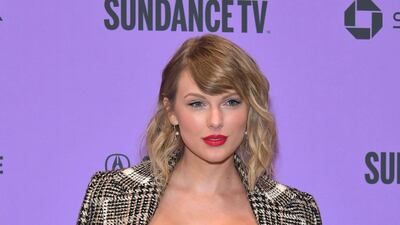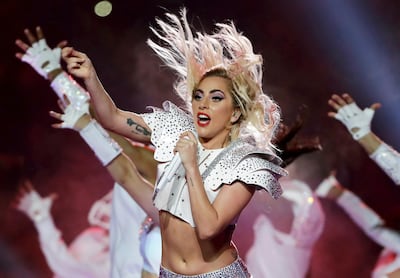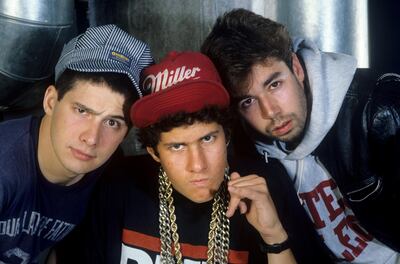A curious event occurs 30 minutes into Taylor Swift's revelatory new documentary, Miss Americana. The much-admired singer walks from a building towards a waiting car, past dozens of excited fans – and completely ignores them. "Well, so, this is my front yard," says Swift, explaining the apparent snub, as her vehicle pulls away. "And I'm highly aware of the fact that that is not normal."
The Shake it Off singer definitely does not encourage such doorstep devotion – her stalker stories crop up later in the film – but she does want to bring people deeper into her world. Hence this documentary, in which she shakes off the glitter to reveal a truer Taylor: her previously unexplored health issues, courtroom dramas and political leanings. Documentaries are a big deal for misunderstood pop stars, who need to make a statement. Social media is too ephemeral; interviews can go awry. Over 85 minutes, you can really express yourself.
The resulting film – directed by the award-winning documentarian Lana Wilson – has already won critical acclaim, and we might see many more quality rock films over the next few years, with music documentaries becoming an increasingly popular front in the battle for streaming superiority.
Miss Americana has its premiere at the prestigious Sundance Film Festival in late January, then landed on Netflix on Friday, one of numerous music films funded by the platform. Also last week, the first trailer dropped for Beastie Boys Story, celebrating another act who went from chart stardom to heartfelt activism. It's directed by Spike Jonze, who helmed their finest video, Sabotage, and makes its debut on Netflix's newer rival Apple TV in April. Your move, Amazon Prime.
A really good rock doc can resonate far beyond the artist's original audience: it's essentially real-life musical theatre, offering great songs interspersed with compelling drama. The Beastie Boys movie has great potential in that respect: rap bad boys who became cause-espousing good guys. The latter-day Beasties were always into extending the brand – the Grand Royal record label; the X-Large clothing range – so a documentary makes perfect sense, particularly if Apple waved a hefty chequebook.
Swift's film shows the singer contemplating turning 30, and finally speaking up. Its most dramatic moment is an argument between Swift and three grey-haired men – including her father – who actively discourage her from addressing politics. "I'm getting to the point where I can't listen to people telling me 'stay out of it'," she declares, so eventually posts a political tweet.
Wilson captures the singer celebrating the subsequent rise in new-voter registrations, minutes before donning an uncomfortable dress for an awards ceremony. It's an intriguing contrast. Such scenes conjure memories of the ultimate backstage experience: Madonna: Truth or Dare, aka In Bed with Madonna, from 1991, the hugely successful tour film that helped make documentaries cool. Funded and produced by Madonna and directed by her discovery, Alek Keshishian, it captured the star at the peak of her career, as she basically decided to take over the media world: books, acting, autobiographical popumentaries. This was Madonna at her most uncompromising, too: the scene where she mocks fellow superstar Kevin Costner caused a sensation, years before reality TV made us immune.
Making a similar classic, on a different platform, is clearly a big motivation for these projects. Backed by Netflix, the star-powered genre is enjoying a resurgence, from Lady Gaga's stylised year-in-the-life, Five Foot Two (2017), to Beyonce's Homecoming, a Grammy-winning look behind her 2018 Coachella show. Getting the documentary treatment is now a pop badge of honour, and – promoted heavily by online platforms – it's a useful way to evolve your brand. And that's essential for female acts, Swift declares in Miss Americana.
“Everyone’s a shiny new toy, for two years,” she says, over a montage of her increasingly elaborate onstage outfits. “The female artists that I know of have reinvented themselves 20 times more than the male artists. They have to, or else you’re out of a job.”
Artist-backed rockumentaries tend to fall into two camps: the glamorous, celebratory film, often based on a single spectacular show, which showcases an artist's talents, onstage and off (Homecoming was written, directed and executive produced by Beyonce). Or there's the grittier affair, in which a cosseted star shows that life isn't always easy behind the velvet rope.
Sometimes one becomes the other, particularly when the filmmaker gains long-term access. Radiohead's ironically titled Meeting People is Easy (1998) is particularly tense, the director Grant Gee hiding cameras backstage as the arty British band endure awkward interviews and general ennui on tour. They could have shelved it, but that edgy paranoia helped cement the band's status as more serious and significant than their Britpop contemporaries.
The Swift and Lady Gaga films delve into darker issues, notably health concerns – Gaga's agonising fibromyalgia; Swift's revelation of an eating disorder, and her mother's illness – and both stars struggle with loneliness, which may surprise their legions of fans. But both also lighten up during studio sessions, and the collaborative process. In Miss Americana, Wilson cleverly blends those nuggets of song creation with footage of the glitzy onstage extravaganzas they eventually become; it's music alchemy, while also demystifying the magic.
Perhaps studio life is different for pop and rock stars. A Radiohead in-studio film would be excruciating, although by far the most devastating example is One More Time with Feeling, one of several fine documentaries about the Australian band Nick Cave and the Bad Seeds. Here, the director Andrew Dominik ostensibly chronicles the recording of their 2016 album Skeleton Tree, but also counsels Cave on the death of his son. It's an extraordinary visual document.
These pop-star films can look like vanity projects, by contrast, but then a big superstar statement can have an enormous impact. Immediately after Miss Americana dropped on Netflix, Swift released a new single from it, Only the Young, held back from the Lover recordings. The song is a clarion call for her fans to get politically active, and as she observes while writing it late in the film, many fans were too young to vote in the 2016 US presidential election. Swift was criticised back then for not being more politically engaged: the song and film both actively answer those critics.
Music documentaries, it seems, can be transformative, for the artist and their audience. It pays to be candid on camera.




